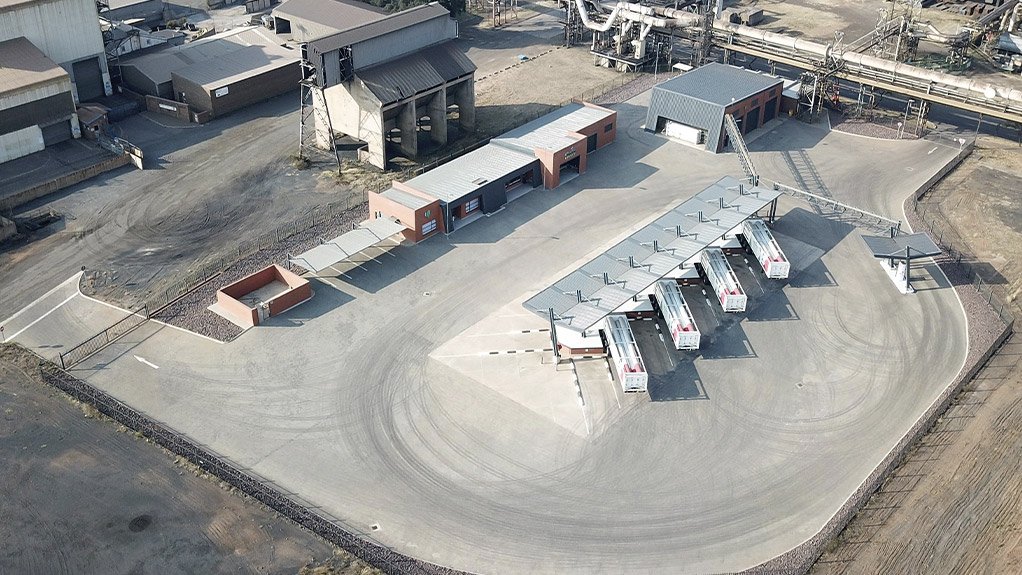

A new energy reality – natural gas’s critical role in SA’s transitioning


NOVO Energy’s compressed natural gas production facility in the Highveld Industrial Park. The operations will be expanded to include a liquid natural gas (LNG) Hub in the near future
By: Andri Hugo, CEO & Founder of NOVO Energy
The news coming out of the Investing in African Mining Indaba must be encouraging to both environmentalists and the mining industry. This most certainly would also include government, business, civil society and labour. Various commitments have been made towards sustainability of business, the environment and ensuring social equity. Having consensus that SA Inc. needs to change and adapt, whether calling it a Just Transition or an Energy / Environmental Transition, is a tremendous milestone that has been reached. Once we move beyond the denial and into admission that we have a serious problem, then we can start to effect change.
For a long time, South Africans knew we had problems so severe that it threatened to tear apart the colourful fabric of our young democracy. We knew by the start of the new millennium that we would have a serious energy crisis by 2007/8. When the first loadshedding started we still thought it to be temporary until we learnt about the severe issues at our new flagship coal power stations and the large-scale plundering and destruction of ESKOM.
Fifteen years later we are now faced with an even bigger challenge. Not only have we not managed to solve our electricity challenges, but we are now seeing the severe effect that this is having on our economy and our people with unemployment reaching almost 40% (excluding the desperate people that have actually given up hope of ever finding a job). Unfortunately, this is not the full picture of the energy crisis that South Africa is facing. Electricity has been hogging the headlines lately especially with regard to renewable generation. South Africa’s primary energy carrier is still coal at more than 60% with oil and gas making up 35%. Renewables only make up a minute percentage. An analysis of final energy consumption (breakdown of the type of energy carrier that is used by the end consumer) shows that electricity only makes up around a quarter of our energy needs (of which 77% is generated by coal and 3% by renewables). Coal still contributes 23% (mainly industrial) while petroleum makes up 31% (transportation and industrial use). Natural gas contributes about 6% of the final mix. Interestingly enough is that we still use wood for 14% of our primary energy.
The important conclusion is that there are other final energy sources needed and being used by the transportation, mining and manufacturing industries. All of this makes sense when considering smelters, boilers, burners and other manufacturing processes that need heat, cooling and steam. After all, our economy was built on the beneficiation of minerals and agricultural products. However, there are more threats lurking for SA Inc. and hopefully we will tackle them differently to how we dealt with our power challenges.
The first major challenge we face is how to deal with coal. Making up most of the primary energy, we remain very reliant on it. The highveld coal complex where most of our old power stations and Sasol are situated is nearing end of life and there is a major local and international demand for high quality coal (accelerated by the inability of renewables to ensure stable energy in Europe and North America). Our new coal power stations are also competing for high quality coal and international demand is pushing prices to record levels. Our ambitions for a Just Transition to cleaner fuels would require that we urgently formulate a plan on how to deal with coal.
Another imminent threat to our energy security, closely linked to our socio-economic goals, is the expected decline of Mozambican natural gas in the next three to four years. This will hit hard at our petrochemicals, minerals and manufacturing sectors that rely heavily on natural gas supply. In addition, Sasol’s decision to withdraw its synthetic methane-rich gas form the market in 2026 will leave many industries stranded without energy. We have already seen this impact on PetroSA with the CEF gas-to-liquids refinery being mothballed. Industry association the Industrial Gas Users Group has frantically been trying to bring this to the attention of government. They represent the major industry in the metals, paper and pulp, and fast moving consumer goods sectors relying on natural gas in their manufacturing processes. Without affordable gas they would have to close their doors.
This would bring us to the final energy threat that South Africa is facing, albeit not a small one. We are currently relying on imports for 60% of our fuel demand including all the fuel used in the aviation, transportation and industrial sectors. The impact can be seen with the recent aviation fuel shortages at OR Tambo International Airport (even with reduced international travel due to Covid-19) and the Eskom open cycle gas turbine peaker plants that are struggling to timeously replenish their diesel supply to meet demand during power plant outages (Eskom’s statistics make for sombre reading with a record number of generation units regularly down due to breakdowns and maintenance). The main contributors to the shortfall of locally produced petroleum products are the shutdown of Engen’s refinery in Durban after an explosion and fire in 2020, lack of feedstock at PetroSA, stopping BP and Shell’s Sapref refinery that represented 35% of South Africa’s refining capacity awaiting its sale and the unfortunate explosion at Glencore’s Astron refinery in Cape Town. Consumers directly experience the impact of our refinery situation through our record high fuel prices and future threat of more costs to be recovered if we have to build new compliant refineries.
Besides the above energy threats, progress on the Renewable Energy Independent Power Producer Programme has been frustratingly slow especially on rounds 5 and 6. In addition, the Risk Mitigation Independent Power Producer Procurement Programme (emergency power) did not deliver the expected and desired results on top of an outdated and very conservative Integrated Resource Plan.
South Africans are notoriously good at making plans and we even have a popular saying ”’n boer maak ‘n plan” (a farmer makes a plan). Fortunately, we are also endowed with people that can actually execute on that plan. Unfortunately, sometimes we spend too much time designing plans and not getting around to implementing them. Perhaps it is a reflection of our nature in striving to get things perfect but it is proving to also be our downfall. When we add the external pressure of environmental, social and corporate governance (ESG), we have to be honest with ourselves that we cannot transition to an idealistic future in one go.
The term “energy realism” is currently emerging in a number of dialogues on energy and climate change. This concept is important for South Africa given our current situation, considering what resources we have at our disposal (capital, natural, human and technology) and our ambitions for the future. The first part of it is the realities of actual coal and petroleum consumption and reliance. The latter part is the realisation that our transition cannot only be viewed from an environmental perspective. Being honest with ourselves and taking proper inventory of our situation and tools at our disposal will assist us to make informed decisions on how we want to transition and which pathway we need to take.
Instead of hoping for the unicorn to arrive to solve our energy problems we should have a solid plan considering all the challenges discussed above. Unfortunately, renewables will not be that saviour. This fact is now internationally acknowledged by institutions such as the International Energy Agency and the European Union. The one matter on which consensus is being reached is that global energy transition needs natural gas. To us this might sound rich coming from developed countries who are the major contributors to emissions, but in our reality this is even more true. Electricity cannot satisfy our energy requirements (transportation and industrial), renewables cannot satisfy all our power requirements (intermittency, storage technology immaturity and infrastructure limitations) and the supply security of all our other energy sources are under threat. In addition, solving some of our challenges such as petroleum product importation will require investments of tens of millions of dollars to upgrade infrastructure. This is besides the fact that resolving our power generation capacity shortfall, when considering their current state and imminent retirement, will have to be done on top of a very large debt liability at Eskom.
Natural gas has the potential to assist us to make a significant transition towards the future in one single step. Not only do we have to resolve our future natural gas supply security for industry and Sasol but it also has the potential to simultaneously address the other energy issues. Supporting renewables in power generation and assisting us in a Just Transition from coal will already be major wins. At the same time, it will wean us off international petroleum. Natural gas might not be the unicorn that we were looking for because we must expand our existing natural gas infrastructure and finalise supply (supported by significant regional gas resources - Rovuma, Namibia, Brulpadda and Free State biogenic gas to name a few). At least this will be a realistic energy plan that can address our predicament in the short term and lead us into the future that we are all aiming for.
President Cyril Ramaphosa summarised this well in his address at the Mining Indaba: “As we confront the reality of energy insecurity and the development of new energy sources, it is critical that South Africa, like all developing economies, be given the necessary developmental space. Countries on the African continent need to be able to explore and extract oil and gas in an environmentally responsible and sustainable manner. These resources are important for energy security, for social and economic development, and for reducing energy poverty on the continent. And we do not see this trajectory as being mutually exclusive to our focus on moving towards ensuring that we reduce our carbon footprint."
NOVO Energy is already playing a significant role in our transition to the new energy reality. Our experienced team engineers solutions to ensure energy security to our customers. These integrated solutions address supply, infrastructure and technology for heat, cooling, steam, power and mobility. Contact us today for a consultation session to assess how to optimise your energy utilisation in a responsible ESG future.


